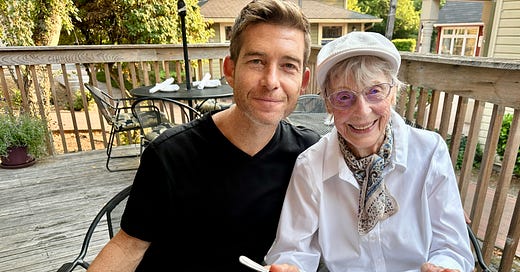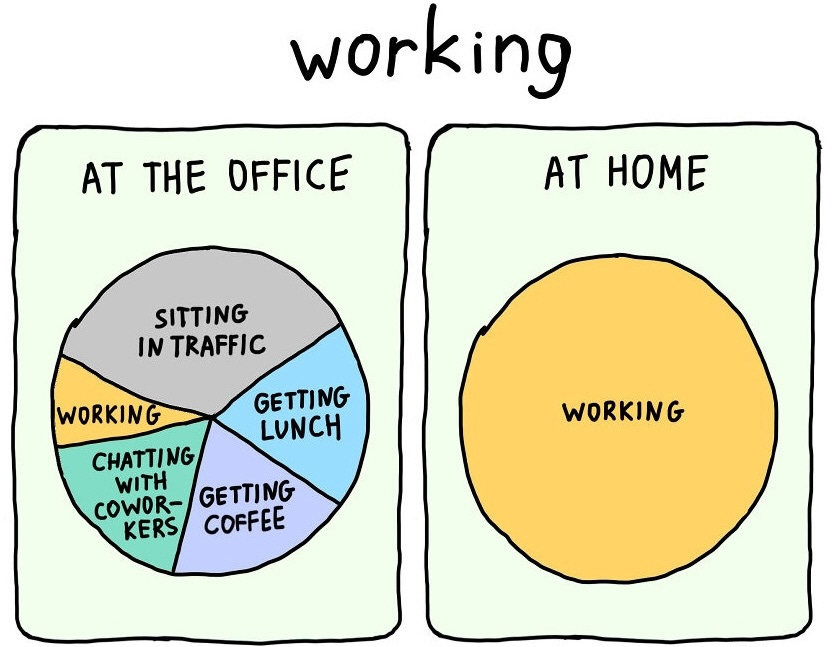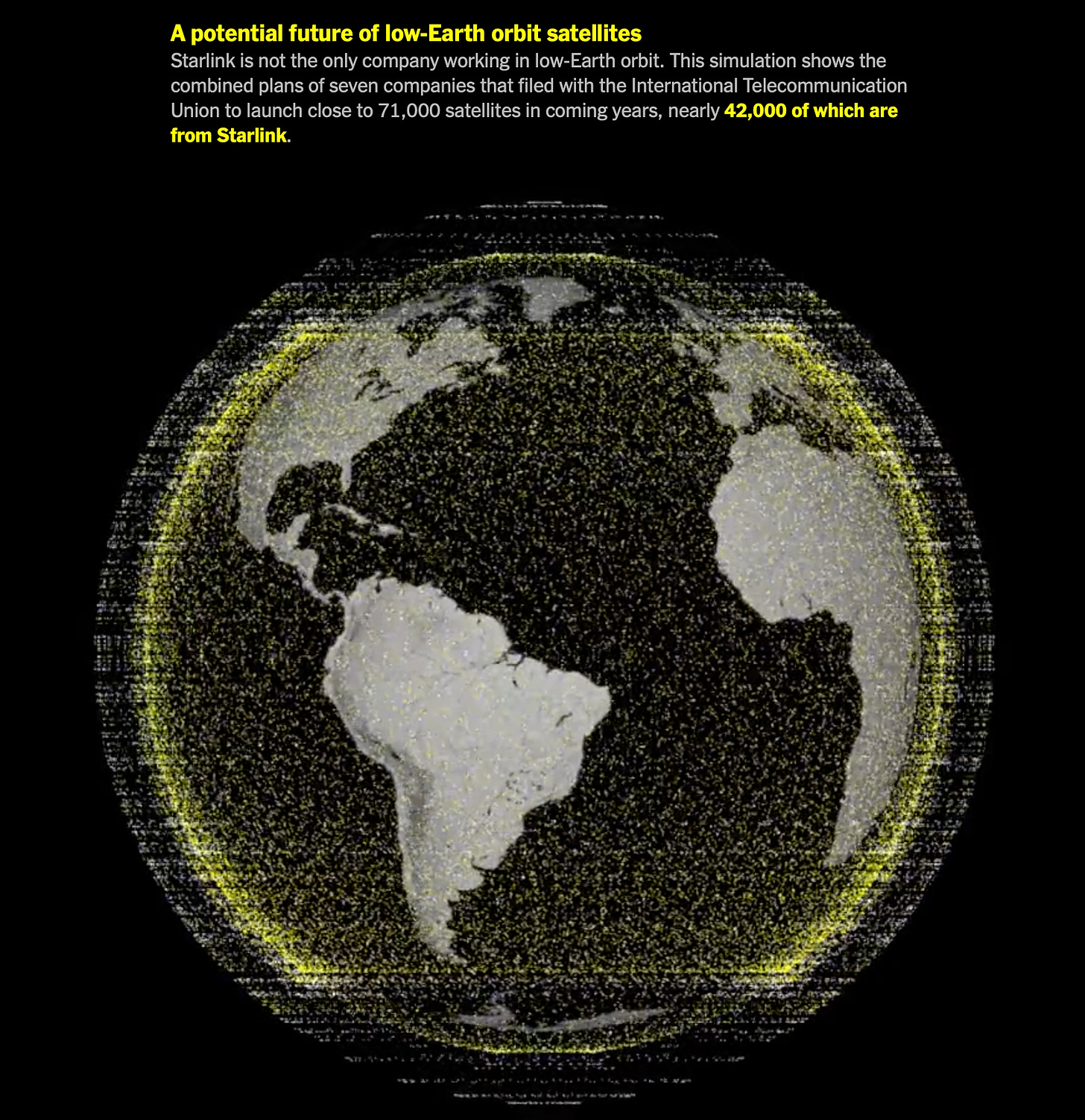That sweet spot between reflective, resourceful, and relaxed
Perhaps less writing, more living, and more chilling 🤔
Dear Friends,
I was such a cliché last week.
Sue Gelber had a funny piece in last week’s New Yorker: “You’ve got to go to this place for vacation:”
The people were so friendly and happy! I really loved the lifestyle of this place. I wish we could move there. Granted, I say that after every vacation, but this time I mean it! This place reminded me of a simpler time—when children played in the dirt with sticks and rocks. Like when our grandparents were young. But without the polio.
I think that I said every line to Iris. Except that, I wasn’t joking. 🙃
Then, as if they had coordinated, Melissa Kirsch wrote in Saturday’s New York Times about how vacation gives us perspective on daily life:
You spend time in a new environment, on a different schedule, maybe eating different things, trying on other ways of living. Back home, you question things. Why do we always eat the same thing for dinner? Why don’t we have the same curiosity about the town where we live as we did about the town where we spent a few days? Why are we hanging on to the cords and cables from every electronic device that ever crossed our threshold?
Now we’re back at home, and I’m asking myself all of those same damn predictable questions. Technically, I wasn’t on vacation, but let’s be honest, I get more work done in two hours at a cafe in paradise than during eight hours at the office. So, essentially, 14 of my 16 wakeful hours each day were vacation. 🆒
Every time I’m on vacation — free from responsibilities, commuting, and office gossip — I’m like, “Oh yeah, this is what it feels like to be alive.” Then, extra inspired after my morning coffee, I come up with a bunch of creative projects that I won’t have time for once I return to Real Life.1
On the last day of vacation, inevitably, I write in my journal, “How can I sustain this same feeling when I return to my daily routine?” I should know by now that I can’t. At least not for the next two months while Iris and I wrap up our time at work, pack up our belongings, and prepare to move to Mexico. But then! Then, we have a year-long sabbatical, and it really is up to me how I structure my time. Is it possible to extend the calm, contentment, and inspiration of last week’s vacation into an entire year? Am I deluding myself?
More enticing thoughts of writing a book
Last week, inspired and relaxed, my thoughts kept drifting to writing a book about “A Brief History of the First Half of the 21st Century.” Toni Morrison once wrote, “If there's a book that you want to read, but it hasn't been written yet, then you must write it.” Maybe this is that book?
At least 15 outlines for chapters came to mind while I rode my bike under pine tree canopies and along Whidbey Island’s emerald coastline. I thought about structuring the book like George Packer’s The Unwinding, or Larissa MacFarquhar’s Stranger’s Drowning: In between chapters that explore the last and next 25 years of particular issues2, I’ll offer mini-biographies of real people — looking at their past 25 years and speculating about what their next 25 years might look like. Half of those speculative biographies would be about well-known personalities: Elon Musk, Oprah Winfrey, Jack Ma, Sheryl Sandberg, Jeff Bezos, Kamala Harris. And then half of them would focus on lesser-known, more relatable folks: the middle-aged Indian call center employee whose predecessor was an American customer service agent and whose successor will be AI; or maybe a mid-level YouTube influencer who spent her 20s in Brooklyn and her 30s in Atlanta and is now trying to figure out where to look for happiness and meaning in her 40s.
After all, I would like for the book to be both relatable and applicable, and I find that it’s often easier for me to think about what I want out of the next 25 years of my own life by thinking about the next 25 years of someone else’s. I recently heard a clever thought experiment: Ask any broke 30-year-old if he or she would want to trade places with Warren Buffet, and they will all say no. Even if you guarantee them that they would live at least another 10 years in reasonably good health, they’ll still turn you down. Which goes to show that most of us value 60 years of not-wealthy living over 10 years of having $110 billion. The purpose of my book, then, would be to spur some imaginative, informed thinking about how we might want to live our next 25 years amid the social, technological, political, and geological changes we should expect.
The resourceful person doesn’t need self-examination
Eventually, the caffeine and endorphins wear off and I ask myself, “Oh, who am I kidding?” Who would ever read this? There is an entire field of professional forecasters and futurists who spend all of their time thinking about this stuff. What could I possibly contribute?3. Larissa MacFarquhar has been writing for the New Yorker since 1998, and George Packer since 2003. And even with their reputations as two of the best American writers, they struggle to sell books. Nobody reads anymore, at least not books.
Maybe I shouldn’t spend my year-long sabbatical articulating things by writing a book. Maybe I should spend the year doing things by building a business.
That was my reaction after reading Venkatesh Rao’s perspective on the examined life versus the resourceful life.
Resourcefulness is steady, patient, problem-solving persistence. A seemingly infinite capacity for a kind of trial-and-error that non-resourceful people would find impossibly draining and exhausting.
He points out that the reflective person (that would be me) questions whether to do this or that. What do I care about? Why? How should I spend my time? The resourceful person is less interested in reflection.
The resourceful person rarely asks is this worth it, because by a rarely questioned default, it always is. Unlike the philosopher who has to examine life to make it worth living, for the resourceful person, the answer is clear without any need for self-examination. The fully lived life is not worth examining.
I know resourceful people — the ones who call 15 people per day, delegate 30 tasks to subordinates, pack their calendars with consecutive meetings, and speak at a conference each week. They’re tireless. I confess I can be judgmental when a resourceful person doesn’t have clarity about why they’re doing all this work in the first place. It’s as if staying busy is the point of being busy.
And yet, there was something about Venkatesh’s celebration of resourcefulness that inspired me to move away from reflection (writing a book) and toward resourcefulness (starting a business). I once read a profile of my Enneagram personality type that warned that I might “replace living through reading.” 😬 It’s true that I feel the most calm and in control when I’m reading and writing, but I probably feel the most fulfilled when I am living. All in moderation, I suppose.
🔊 The most resourceful person: Elon Musk
When I read Venkatesh’s essay, it helped me understand why I admire Elon Musk’s resourcefulness while rolling my eyes at his lack of reflection. The distinction comes through clearly in a couple of podcasts I listened to last week while cycling around Whidbey.
The latest Land of the Giants season is about much more than just Tesla. First, how did I not know that Elon wasn’t the founder of Tesla? In fact, he ousted Tesla’s founders in the same way that he was ousted from PayPal back in 2000. Anyway, this is great business journalism and storytelling throughout. Highly recommended.
I’ve been so distracted by the latest from Tesla, X.com, and Elon’s new effort to compete with OpenAI that I kinda forgot about Starlink (even though it will surely become our internet service provider when we move to Oaxaca). And so, I was blown away by the speed of Starlink’s development, including more than 4,500 satellites orbiting the planet and 1.5 million customers in 50 countries. Ukraine’s military is totally dependent on Starlink and Elon himself has bragged that “between, Tesla, Starlink & Twitter, I may have more real-time global economic data in one head than anyone ever.”
It’s a remarkable amount of power in the hands of one person. I’m reminded of Ian Bremmer’s recent observation that we’re transitioning into a global order where the US is no longer the sole superpower and into what Anne-Marie Slaughter has called “The Networked Century,” where a single company (or billionaire) could have more geopolitical influence than a regional bloc of countries.
📸 The relaxed life
While I continue to ponder how much of my time and energy to dedicate to reflection versus resourcefulness, I hope to not forget about relaxation. And so here is a photo from a wandering sunset walk with Iris after a soothing ocean swim to remind me:
👏 Kudos: Nana turns 94!
My grandmother turned 94 last week! Iris and I took her out for her favorite meal after she was done jamming out with her jazz band. I fully expect her to live to 100, and when she does, then I’ll finally be half her age. I’m having a hell of a time trying to imagine the world in 25 years … how in the hell will we all be living by the time I’m her age in 2070!?
Wherever you may be, I hope you feel more relaxed and reflective than Elon, and that you have a great week,
David
I imagine I’m not alone in that 90% of the creative projects I cook up when on vacation never come to fruition. But last year when we were on Whidbey Island I toyed around with launching a weekly newsletter, and what do you know, it’s still around. Luis and I were in the process of launching our buddy podcast, The Twelve Inquiries, and it’s sorta still around too (with a new episode coming soonish).
Among the issues that I’m interested in exploring: demographics, finance, marriage, housing, education, health, energy, dating, global trade, transit, climate, agriculture, democracy, communication, creativity, and dying.
I haven’t even read Phillip Tetlock’s book Superforecasting or any of the other hundreds of books about forecasting the future.









Interesting, I never would have placed resourcefulness and reflection at opposite ends of a spectrum. I'm both fascinated and skeptical of all of the various personality frameworks - but leave it to us who skew reflective to know where we land on all of them! Also, Alex says the exact same things EVERY TIME we go anywhere, and is inevitably looking up real estate on Zillow by the time we leave. I feel those things, but am simultaneously very aware that they are a product of my brain in "vacation mode" rather than the physical surroundings. The grass is always greener...
I wonder why you think about reflection and relaxation as independent activities. To me they're greatly intertwined.
Also: I've been waiting for a new episode of the 12 inquiries for months now, c'mon guys!